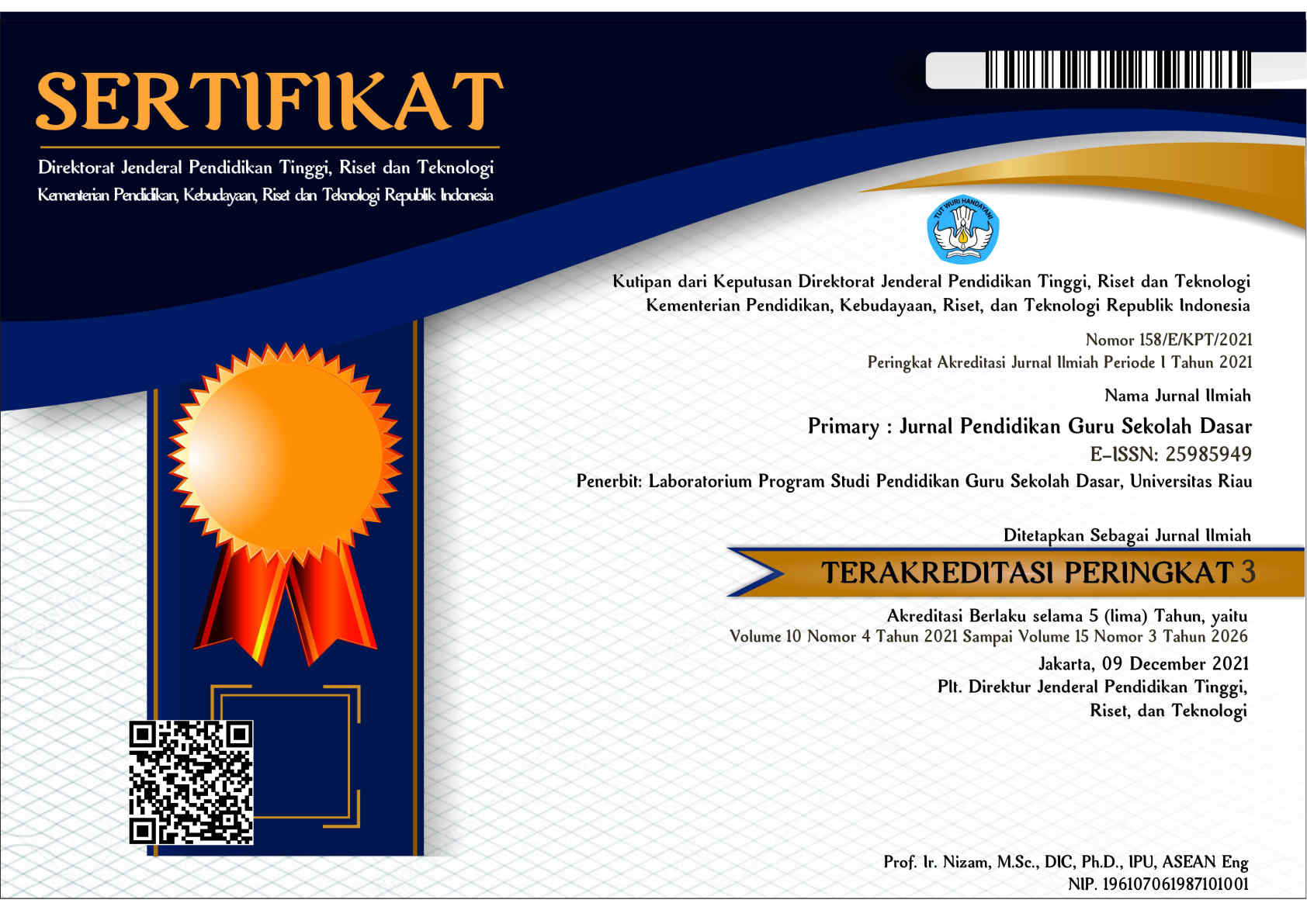THE EFFECT OF GAME-BASED LEARNING MODEL ASSISTED BY A BAMBOOZLE ON THE MULTIPLICATION OPERATION SKILLS OF ELEMENTARY SCHOOL STUDENTS
Abstract
Skills in solving multiplication operations are categorized as very low for second-grade elementary school students. The purpose of the research in this article is to determine the effect of the game-based learning model assisted by "Bamboozle" on the multiplication operation skills of elementary school students at Islamic Elementary School of Al Hidayah in the academic year 2021/2002. The research used experimental quantitative research with a One Group Pretest-Posttest design. The research used a saturated sample as a sampling technique and a test as a data collection method. The results showed that the pre-treatment mean score was 63.33 lower than the post-treatment mean score of 91.90. By using the Wilcoxon test data analysis method, based on 21 study samples all of them have increased from pre-test to post-test with an average score of 11.00. In addition, by looking at the Asymp value. Sig. (2-tailed) 0.000 < 0.05, it could be concluded that there was a significant effect of the implementation of the game-based learning model assisted by the "Bamboozle" on the multiplication operation skills for the second-grade students of SD Islam Al-Hidayah in the academic year 2021/2022.
Keywords
Full Text:
PDFReferences
Alhusna, C., Setiawan, D., Yolanda, S., Suryani, S. I., Nadia, T. N., Cania, Y. A., & Mujib, A. (2020). Menemukan Pola Perkalian Dengan Angka 9. Jurnal Pendidikan Dan Pembelajaran Terpadu (JPPT), 02(01), 55–70.
Burns, M. K., Ysseldyke, J., Nelson, P. M., & Kanive, R. (2015). Number of repetitions required to retain single-digit multiplication math facts for elementary students. School Psychology Quarterly, 30(3), 398–405. https://doi.org/10.1037/spq0000097
Deng, L., Wu, S., Chen, Y., & Peng, Z. (2020). Digital game-based learning in a Shanghai primary-school mathematics class: A case study. Journal of Computer Assisted Learning, 36(5), 709–717. https://doi.org/10.1111/jcal.12438
Febriani, P., Widada, W., & Herawaty, D. (2019). Pengaruh Pembelajaran Matematika Realistik Berbasis Etnomatematika Terhadap Kemampuan Pemahaman Konsep Matematika Siswa SMA Kota Bengkulu. Jurnal Pendidikan Matematika Raflesia, 04(02), 120–135. https://ejournal.unib.ac.id/index.php/jpmr/article/view/9761/4795
Hung, C. Y., Sun, J. C. Y., & Liu, J. Y. (2019). Effects of flipped classrooms integrated with MOOCs and game-based learning on the learning motivation and outcomes of students from different backgrounds. Interactive Learning Environments, 27(8), 1028–1046. https://doi.org/10.1080/10494820.2018.1481103
Krisbiantoro, B. (2020). The effectiveness of gamification to enhance students’ mastery on tenses viewed from students’ creativity. Journal of Advanced Multidisciplinary Research, 1(2), 73. https://doi.org/10.30659/jamr.1.2.73-97
Liu, Z. Y., Shaikh, Z. A., & Gazizova, F. (2020). Using the Concept of Game-Based Learning in Education. International Journal of Emerging Technfile:///C:/Users/Hp/Downloads/Baru/32729-77443-1-PB.Pdfologies in Learning, 15(14), 53–64. https://doi.org/10.3991/ijet.v15i14.14675
Mao, W., Cui, Y., Chiu, M. M., & Lei, H. (2022). Effects of Game-Based Learning on Students’ Critical Thinking: A Meta-Analysis. Journal of Educational Computing Research, 59(8), 1682–1708. https://doi.org/10.1177/07356331211007098
Maulyda, M. A. (2020). Paradigma Pembelajaran Matematika Berbasis NCTM. CV IRDH.
Mei, M. F., Baptis Seto, S., & Trisna Sero Wondo, M. (2020). Pembelajaran Kontekstual Melalui Permainan Kelereng Pada Siswa Kelas Iii Sd Untuk Meningkatkan Pemahaman Konsep Perkalian. Jupika: Jurnal Pendidikan Matematika, 3(2), 61–70. https://doi.org/10.37478/jupika.v3i2.669
Mohd, C. K. N. C. K., Shahbodin, F., Sedek, M., & Samsudin, M. (2020). Game based learning for autism in learning mathematics. International Journal of Advanced Science and Technology, 29(5), 4684–4691.
Partovi, T., & Razavi, M. R. (2019). The effect of game-based learning on academic achievement motivation of elementary school students. Learning and Motivation, 68(August), 101592. https://doi.org/10.1016/j.lmot.2019.101592
Pérez, M. E. del M., Guzmán Duque, A. P., & García, L. C. F. (2018). Game-based learning: Increasing the logical-mathematical, naturalistic, and linguistic learning levels of primary school students. Journal of New Approaches in Educational Research, 7(1), 31–39. https://doi.org/10.7821/naer.2018.1.248
Pratama, L. D., & Setyaningrum, W. (2018). Game-Based Learning: The effects on student cognitive and affective aspects. Journal of Physics: Conference Series, 1097(1). https://doi.org/10.1088/1742-6596/1097/1/012123
Qolbi, M. S., At Thaariq, Z. Z., Az-Zahroh, S. F., Anwar, M. M., & Faiza, N. (2019). Design and Development of Game Based Learning Applications for Mathematics Learning Based on Multiple Language to Develop Verbal Capabilities. JPP (Jurnal Pendidikan Dan Pembelajaran), 26(2), 51–56. https://doi.org/10.17977/um047v26i22019p051
Sadikin, A., & Hamidah, A. (2020). Pembelajaran Daring di Tengah Wabah Covid-19. Biodik, 6(2), 214–224. https://doi.org/10.22437/bio.v6i2.9759
Sugiyono. (2019). Metode Penelitian Kualitatif Pendidikan (Pendekatan Kuantitatif, Kualitatif, dan R&D). Alfabeta.
Tokac, U., Novak, E., & Thompson, C. G. (2019). Effects of game-based learning on students’ mathematics achievement: A meta-analysis. Journal of Computer Assisted Learning, 35(3), 407–420. https://doi.org/10.1111/jcal.12347
Wibawa, A. C. P., Mumtaziah, H. Q., Sholaihah, L. A., & Hikmawan, R. (2021). Game-Based Learning (Gbl) Sebagai Inovasi Dan Solusi Percepatan Adaptasi Belajar Pada Masa New Normal. Integrated, 3(1), 17–22.
Yusuf, M. (2014). Metode Penelitian Kuantitatif, Kualitatif, & Penelitian Gabungan. Kencana.
DOI: http://dx.doi.org/10.33578/jpfkip.v11i4.9000
Refbacks
- There are currently no refbacks.
Copyright (c) 2022 Irma Retno Rahayu, Diki Rukmana

This work is licensed under a Creative Commons Attribution-NonCommercial-ShareAlike 4.0 International License.
____________________________________________________________
Primary: Jurnal Pendidikan Guru Sekolah Dasar
Secretariat
Program Studi Pendidikan Guru Sekolah Dasar
Gedung B1, FKIP Universitas Riau
Kampus Bina Widya Km. 12,5 Simpang Baru Panam
Pekanbaru Riau Indonesia 28293
e-mail : primary@ejournal.unri.ac.id



